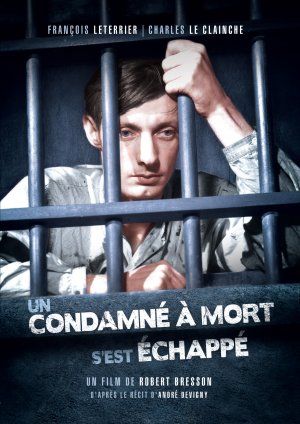Movies We Like
A Man Escaped
Dir: Robert Bresson, 1956. Starring: Francois Leterrier, Charles Le Clainche, Maurice Beerblock. Foreign. French.

What do you think of when you hear the term French New Wave? Do you think of Francois Truffaut's The 400 Blows or Breathless, Jean-Luc Godard's first feature film? Surely the majority of those who adore the movement and acknowledge its influences believe that Truffaut, and in some circles, Godard, were the inventors of the French New Wave. Not to spit in anyone's soup, but I'd argue against those claims using this film alone. The attractiveness of a film like The 400 Blows comes from its simplicity and the relation of the film to the director. Of course there's the auteur theory mixed in and Truffaut did write the film, but the most important aspect of it is the director’s relation to story and how well its messages were relayed based on that relationship. The 400 Blows is an autobiographical tale that stems from Truffaut's boyhood, and therefore no-one else could have made it work except him. In that sense, it resembles art more than entertainment because of the personal aspect and a story about societal detachment, which many people can relate to. But he wasn't the first to make such a film. Robert Bresson, one of my favorite directors, did the same thing these directors did, only first. A Man Escaped is about a French POW, and in reality Bresson spent time as a POW in Germany before becoming a screenwriter and director.
The film opens with a note from Bresson that simply states, “This is a true story.” Nowhere does it imply that it is his story or something similar, just that it's not a fabrication. Followed by this is the image of a stone and etched into it is a short passage paying respects to 7,000 Frenchmen who were killed by Nazis and Nazi allies. Next we see a simple sequence of a handsome man riding in a car. The camera is focused on his hands, which slowly creep towards the door handle of the moving vehicle. As the camera pulls away, we see two men handcuffed beside him and can make out “SS” uniforms on the driver and front passenger. We see the man hesitate and consider leaping from the car, and eventually he musters up the courage to do so. Within seconds he's returned and pistol-whipped as punishment, but they keep him alive and put him in prison. This opening sequence sets the stage for a story that has enough suspense to stand up to Hitchcock and enough pathos and realism to be considered the true beginning of French New Wave.
General Fontaine (Francois Leterrier) quickly learns to adapt to his new surroundings by studying the other prisoners. He takes an inventory of his small cell, subconsciously trying to decide if anything inside of it can help him escape. His first neighbor in the opposite cell introduces the prospect of communication by tapping Morse code on the wall. The two introduce themselves and explain how and why they were captured. A small shelf above his cot allows him to reach a barred window and oversee the courtyard. Below an elderly Frenchman and his two companions shuffle through the grounds and linger next to Fontaine’s cell. The two strike up a conversation in which the old man informs him that he’s able to smuggle letters in and out of the prison. Once Fontaine learns that he has allies he feels as though he’s obtained a subtle victory and grows optimistic about the possibility of surviving.
Over the course of several months he makes intricate plans to escape. His cell is moved and he meets other people who’ve been there longer and appear to be broken. The men range from newlyweds and priests to teenagers and the elderly. He revises his plans based on the mistakes of others who’ve tried to escape and failed, only to be executed. When his plan becomes solid and there is suspicion that he will be executed for his lack of cooperation, he tries to muster up the will to actually go through with his escape. He also comes to the conclusion that he needs a partner in order to make everything work, but those around him are too petrified to take the risk. Around this same time the prison is reaching capacity and those who were kept alone in their cell end up getting cellmates. A 16-year-old boy is moved into Fontaine’s cell just when he’s made up his mind to flee. The boy’s arrival presents itself as a gift and a curse. He struggles with the impulse to ask him for assistance. He also comes to the conclusion that if the boy does not agree to accompany him, he might have to kill him or else risk having someone know the details of his plans and get him killed.
A description of the film’s plot doesn’t do it justice, nor does it exemplify the level of suspense that is reached within every frame. The soundtrack of the film is an odd mixture: part Mozart, part Fontaine’s voiceover, and the sound of a nearby train. The audio, mixed with the Noir-like shadows and the brilliance of Leterrier’s performance, is what makes you a nervous wreck throughout the entire movie. Like Truffaut, Bresson cast non-actors and unknowns, and the choice to do so really made a huge difference.
No amount of description could ever crystallize the film’s perfection, but it is well worth everyone’s time. Bresson went on to do other great films, such as Pickpocket, Au Hasard Balthazar, and Mouchette, and then practically stopped directing and instead continued to write. His films did more than inspire much of the French New Wave that followed—in my opinion, A Man Escaped is a template for the movement and was never given its proper dues. Highly Recommended.
The film opens with a note from Bresson that simply states, “This is a true story.” Nowhere does it imply that it is his story or something similar, just that it's not a fabrication. Followed by this is the image of a stone and etched into it is a short passage paying respects to 7,000 Frenchmen who were killed by Nazis and Nazi allies. Next we see a simple sequence of a handsome man riding in a car. The camera is focused on his hands, which slowly creep towards the door handle of the moving vehicle. As the camera pulls away, we see two men handcuffed beside him and can make out “SS” uniforms on the driver and front passenger. We see the man hesitate and consider leaping from the car, and eventually he musters up the courage to do so. Within seconds he's returned and pistol-whipped as punishment, but they keep him alive and put him in prison. This opening sequence sets the stage for a story that has enough suspense to stand up to Hitchcock and enough pathos and realism to be considered the true beginning of French New Wave.
General Fontaine (Francois Leterrier) quickly learns to adapt to his new surroundings by studying the other prisoners. He takes an inventory of his small cell, subconsciously trying to decide if anything inside of it can help him escape. His first neighbor in the opposite cell introduces the prospect of communication by tapping Morse code on the wall. The two introduce themselves and explain how and why they were captured. A small shelf above his cot allows him to reach a barred window and oversee the courtyard. Below an elderly Frenchman and his two companions shuffle through the grounds and linger next to Fontaine’s cell. The two strike up a conversation in which the old man informs him that he’s able to smuggle letters in and out of the prison. Once Fontaine learns that he has allies he feels as though he’s obtained a subtle victory and grows optimistic about the possibility of surviving.
Over the course of several months he makes intricate plans to escape. His cell is moved and he meets other people who’ve been there longer and appear to be broken. The men range from newlyweds and priests to teenagers and the elderly. He revises his plans based on the mistakes of others who’ve tried to escape and failed, only to be executed. When his plan becomes solid and there is suspicion that he will be executed for his lack of cooperation, he tries to muster up the will to actually go through with his escape. He also comes to the conclusion that he needs a partner in order to make everything work, but those around him are too petrified to take the risk. Around this same time the prison is reaching capacity and those who were kept alone in their cell end up getting cellmates. A 16-year-old boy is moved into Fontaine’s cell just when he’s made up his mind to flee. The boy’s arrival presents itself as a gift and a curse. He struggles with the impulse to ask him for assistance. He also comes to the conclusion that if the boy does not agree to accompany him, he might have to kill him or else risk having someone know the details of his plans and get him killed.
A description of the film’s plot doesn’t do it justice, nor does it exemplify the level of suspense that is reached within every frame. The soundtrack of the film is an odd mixture: part Mozart, part Fontaine’s voiceover, and the sound of a nearby train. The audio, mixed with the Noir-like shadows and the brilliance of Leterrier’s performance, is what makes you a nervous wreck throughout the entire movie. Like Truffaut, Bresson cast non-actors and unknowns, and the choice to do so really made a huge difference.
No amount of description could ever crystallize the film’s perfection, but it is well worth everyone’s time. Bresson went on to do other great films, such as Pickpocket, Au Hasard Balthazar, and Mouchette, and then practically stopped directing and instead continued to write. His films did more than inspire much of the French New Wave that followed—in my opinion, A Man Escaped is a template for the movement and was never given its proper dues. Highly Recommended.
Posted by:
Edythe Smith
Sep 19, 2011 10:32pm




